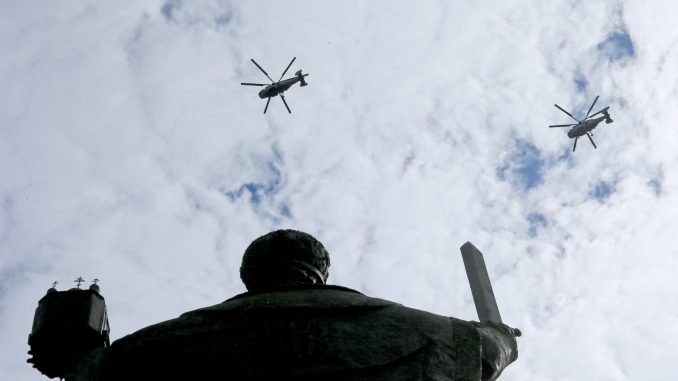
What is next in the line?
The Scots got fed up with the United Kingdom and the Queen. And although their referendum on independence returned a solid ‘no’, a new vote on the same cause seems as imminent as perhaps the UK’s departure from the EU club.
Well, good luck guys.
The Russia-instigated frenzy for independence in the former Soviet republic of Ukraine (welcome to the threshold of the European Union, guys, if you will ever be able to really get in!) has cost Ukraine two precious chunks of the land – the Crimea Peninsula and Donetsk-Luhansk.
With the US and the world’s eyes today set on ISIS in Syria and Iraq, Ebola in Africa and the budding new downturn in world economy, who on earth can recall how Crimea seceded from Ukraine and became Russia’s newest addition?
Disturbingly to Ukraine, with the attention of the “good world cop”, the US, diverted elsewhere, the formation of the new “Donetsk and Luhansk People’s Republics”, whose next move will likely be filing papers for admission into the Russian Federation – again, through a “referendum “ – seems imminent.
In most recent developments, the Catalans have overwhelmingly backed a split from Spain. Although the independence vote was informal and non-binding, it saw an impressive 2 million out of some 5.4 million people take part in the plebiscite, in which a whopping 80 percent voted for independence.
Quite impressive, folks.
My question is this: who is next in line for independence?
Real, recognized or quasi-independence, no matter which.
Can Kaliningrad, the Russian exclave squeezed between Lithuania and Poland, break away from the Russian Federation and perhaps be divided between the two?
Maybe the same way that Russian President Vladimir Putin suggested Polish PM Donald Tusk to divide Ukraine between the two countries back in 2008?
Without any doubt, no other Russian region seems to be more “fitting” for secession as Kaliningrad, Russia’s westernmost oblast, encircled by Poland and Lithuania and once part of German East Prussia.
Remember, the Soviet Union, Russia’s predecessor, occupied what is now known as Kaliningrad right after the Second World War.
In a similar pattern, Russia has seized Crimea, justifying itself by saying it was correcting a blunder of former USSR eccentric leader Nikita Khrushchev, who in 1954 handed the region over to Ukraine.
Russia, the successor state of the Soviet Union, has now surely “restored” the justice, executing the Crimeans’ will expressed in a referendum this year.
So now, to follow the same logics, it is Germany’s turn to claim Kaliningrad back.
All the good folks in Kaliningrad now need to do is to give at least a slightest hint that they want that.
But the signs that the exclave’s residents have been sending to the world over the last five years have been rather mixed and therefore in need of some clarification.
Quite frankly, a couple of years ago, I thought Kaliningrad was on the verge of bubbling up and bursting out.
Things in 2010 looked indeed quite bad in Kaliningrad, when over 10,000 people, called out onto the streets by the “Solidarnost”movement (the protest was supported in fact by all the regional parties except Putin’s “United Russia”) – clamoured for the resignation of the-then Kaliningrad governor and the-then Russian Prime Minister Vladimir Putin, whom they blamed for the economic backwardness and political stagnation of the region.
The Kremlin was quick to react, but instead of tear-gassing the protestors, they chose “a European way” to deal with the explosive situation – sacked the governor, did some self-blaming for “overlooking” the region’s needs and pumped millions into the region’s economy.
It worked: the unrest tapered off, but the economy hardly got any better, with the Kaliningradians streaming to shop to next-door Poland and Klaipėda.
The residents of Kaliningrad have never fallen back in love with Putin, who has received 52% of the vote – a lukewarm result by Russian standards – in the 2012 presidential election.
Yet, with the polls showing the Kaliningrad population’s dissatisfaction with the local economic situation greater than anywhere else in Russia and the exacerbating plight in the region following the EU and ES sanctions, the exclave remains pretty calm.
In fact, unusually calm considering the backdrop of recent events and the pronounced animosity to the country’s leader, Putin.
“He’s a bit of a cuckoo and everyone knows it,” a friend of mine from Kaliningrad has told me, referring to President Putin. “But you won’t believe it, people in the region now are more passive than a few years ago. This is the phenomenon of Putin. The system built on the quasi-democracy and the fear from (of) the old times works so well it keeps people away from the streets,” he explained.
If anyone expects the exclave to go rebellious any time soon, their hopes are deeply misled or perhaps they are victims or Western propaganda. And laugh off anyone zeroing on Kaliningrad as the next break-away region.
It’s impossible, unless Germany, too, decides to restore the “historic justice”.
So what is next in the line?

Be the first to comment